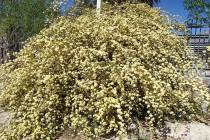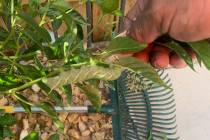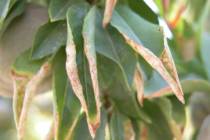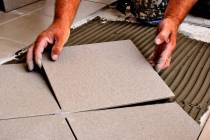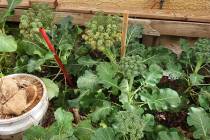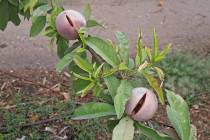Fall transplants to be sold at orchard
On Saturdays Sept. 4 and 11 from 7 a.m. to noon the University of Nevada Cooperative Extension will have fall and tender vegetable and herb transplants for fall planting available for sale at the Master Gardener Orchard in North Las Vegas. The list is provided in my newsletter or can be sent to you if you e-mail me at morrisr@unce.unr.edu .
Some of these transplants will be tender winter transplants that can perform for a long period of time if planted in a warm microclimate in your landscape. Others are true fall and winter transplants and can be planted in more unprotected spaces.
Q: I don't know if it's because we got more rain than usual this past winter, but I have had the same trees for nine years now and both my palm tree and my purple plum are producing things (such as those pollen flowers and little cherry plums) that they never did before. I really hope it doesn't happen again as they are making quite a mess. Is there anything I can do to prevent them from producing things that I really don't want them to?
A: I was given two jars of plum jelly from ornamental plums here in the valley and they were outstanding. I have been telling people that ornamental plums do not produce enough fruit to justify putting in their yards for fruit production, and still maintain that point of view. However, they do produce enough fruit to be a nuisance if you don't want the fruit. It has nothing to do with this unusual year. Expect it from now on.
There really isn't much you can do about the plums unless you want to go through the tree and prune out all of the very short shoots that produce flowers. There are some chemicals sold that you can spray when the flowers are open that may help reduce the amount of fruit produced on the plum, but it won't work on the palm. If the palm is short enough, you can clip off or prune the flower stalk as it is emerging in the spring or summer. If it is too tall, there's little you can do unless you climb it.
I like to tell people that horticulture is the science and art of getting plants to do what you want them to do and not necessarily what they want to do. In this case, I think the plants are winning.
By the way, date harvest is coming up from your local date palm. There are lots of date trees in town that are just begging to be harvested -- with permission of course. I will tell you when and how to harvest and cure them in my newsletter.
Q: I believe I have an infestation of leafhoppers on my grapes. See my attached photos. The Red Flame grape was OK, but it has begun to show the same problem. Is there anything I can do at this stage to help either plant?
A: You are right. The closeup picture shows fecal deposits from leafhoppers. There's not much you can do at this point. The primary problem is fecal deposits on the berries; there's no long-term damage to the vines. And it is not a big problem with the berries unless you are planning to sell them. People don't like to look at berries covered in black spots.
It is best to get one or two applications of Spinosad starting in mid-May to reduce leafhopper levels. This knocks out the immature (nymphs) before they become adults and can reproduce. Just a couple of applications is enough. You can try spraying now with Spinosad and you may reduce the levels, but you will not get total control. Make sure you read the label before applying.
Q: My mature sago palm has started to develop white or dead spikes all through the fronds. What needs to be done to prevent further damage?
A: Without seeing it or a picture of it I am thinking it may be damage from too much direct sunlight. They tolerate shady areas and do best in eastern and northern exposures. If located in a south or west exposure they will be stressed and can develop the white color on the leaflets. If the fronds are yellowing, it is more likely poor drainage or watering too often.
Bob Morris is an associate professor with the University of Nevada Cooperative Extension. Direct gardening questions to the master gardener hot line at 257-5555 or contact Morris by e-mail at morrisr@unce.unr.edu.










